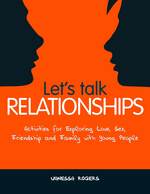 Vanessa Rogers is a nationally acclaimed youth work consultant in the UK and has written a number of popular resource books for JKP aimed at those working with young people.
Vanessa Rogers is a nationally acclaimed youth work consultant in the UK and has written a number of popular resource books for JKP aimed at those working with young people.
Here she answers some questions about her latest book, Let’s Talk Relationships: Activities for Exploring Love, Sex, Friendship and Family with Young People.
Tell us about this book – how did you develop the exercises?
This book has gathered together all the resources that I have developed (or been given) over the years that I have worked with young people around one of the most important topics: relationships.
Not just about sex and intimate relationships, this book is also a collection of ideas to work with young people to explore the values of friendship and trust, peer pressure and considers ways to build good relationships with parents through the rocky road of adolescence.
One if the key messages for teachers, social workers, health and youth work professionals, or indeed parents, using the book is that all of the activities have been tried and tested with young people – and they work!
Why is it so hard for young people to talk about relationships in a serious way?
I am not sure that it is hard for young people to talk about relationships! I think the challenge is to create an environment where young people can safely discuss their feelings, hopes and dreams, as well as ask questions about the things that are important to them, without the fear of being ‘judged’. This involves setting clear boundaries and creating a supportive space for learning to take place.
After all relationships are serious – but they should also be fun and enrich people’s lives, and this is one of the key messages running through the book. It is important to enable young people to develop the skills to feel confident, be assertive about what they want from a relationship and have self-respect, as well as respect for others and the wider community. That way they should be able to make good, healthy choices about their friendships and other relationships.
How do positive relationships with family, friends and mentors bolster a young person’s self-esteem?
Research would certainly suggest that there are clear links between self-esteem and positive relationships. From my own work I have seen the confidence that grows from a young person feeling loved and respected by their friends and family, and giving love and respect in return. This is not about everybody getting on all of the time, adolescence is a time of turbulence as teenagers struggle to find out who they are and take emotional risks, but building resilience to help them weather the knocks that life offers and come through it well.
 In terms of getting young people to open up about relationships, when is a one-to-one setting preferable? What about the group setting?
In terms of getting young people to open up about relationships, when is a one-to-one setting preferable? What about the group setting?
Most of the activities in the book can be easily adapted for one-to-one work or for parents to use to prompt discussion with their teenagers.
In terms of preference, it may well be more appropriate to speak one to one about very personal issues, or if you have a young person who would struggle to cope in a group.
However, for the most part these session plans are around raising awareness and learning together, rather than a counseling resource. For me, the ideal for working with young people around relationship issues is a small group of between 8 and 12. If you plan to do sex and relationships work you may want to consider of the young people would talk more comfortable in a single gender group. Alternatively you may decide that the young men and women could learn from each other!
What should parents, youth workers and other facilitators do to prepare themselves for talking about relationships with young people?
I think the main advice I would offer is to learn to listen. Often young people have plenty to say, but have no one they trust enough to say it to. Set out your boundaries at the start so that they know exactly what can be kept confidential and what can’t. Create opportunities where young people can explore ideas and discuss issues, without it being personal, some of the scenarios and role-plays in the book are ideal for this.
Don’t make assumptions about the relationships that young people have or their sexuality. Remember two things – not all young people are having sex (the average age in the UK to have sex of the first time is 16), and not all young people are heterosexual! Equally, lots of young people might have taken part in sex education at school, but it is the relationship side of it that needs exploring. Offering the opportunity to talk about the relationships they have and the relationships they would like for the future can be invaluable.
Finally, set aside time and make sure that you have information about support mechanisms in place for those that need it.
Copyright © Jessica Kingsley Publishers 2010.